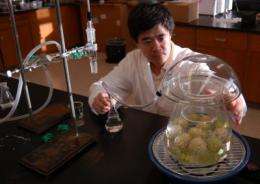UOG projects on aphids, compost and noni funded

T-STAR (Tropical and Subtropical Agriculture Research) is a special grant program explicitly for research that enhances the development of sound tropical and subtropical agricultural practices.
These funded projects will serve farmers and consumers in the region as well as introduce a new species of aphid to taxonomic keys.
Ross Miller, research entomologist with WPTRC was awarded $138,795 to continue investigating the morphometric, genetic and ecological variation of aphids in the region. His research team has recently demonstrated through DNA barcode and morphometric analyses, that what was once thought to be one species of aphid is actually two. This discovery is important to banana farmers as one aphid species, Pentalonia nigronervosa is the vector for the dreaded banana bunchy top virus (BBTV). "We will use these funds to examine the distribution of both aphid species throughout Micronesia, and examine their ability to harbor and transmit BBTV to banana and to other host plants as well as update taxonomic keys and management guides for these aphids that reflect their true status as independent species," says Miller. This project involves collaboration with George Wall, WPTRC plant pathologist and several off-island experts including Keith Pike of Washington State University (Prosser), and Robert Foottit of Agriculture & AgriFood Canada (Ottawa).
Soil scientist, Mohammad Golabi received $146,135 to evaluate the environmental impact of utilizing composted organic waste for improving soil quality and agricultural sustainability. "The main goal of this study," says Golabi, " is not only to determine the effect of land application of compost for soil quality improvement, but also evaluate the environmental impact of its application on the porous soils of northern Guam." Golabi's on-going experiments have shown that under the unique climatic conditions of Guam, land application of composted organic waste enhances soil quality and, not only increases soil fertility and crop yield but also protects the soil against erosion and long-term degradation.
Food scientist, Jian Yang was awarded $160,338 for his research on noni (Morinda citrifolia), specifically to identify marker compounds and indicators as a measure to determine shelf life and quality control for noni botanical dietary supplements. Noni juice and powder are marketed as supplements for improving health. More than 200 phytochemicals (health-protecting compounds) have been identified from the noni plant. However, what exactly is in the packages consumers buy is not known. "Based on marker compounds or phytochemicals, obtaining a reliable shelf life for noni products will ensure that consumers will receive the health benefits they are expecting," says Yang.
"WPTRC scientists in partnership with USDA continue to keep the needs of farmers, consumers, the ecosystems of Guam and the region on their research agendas," says Greg Wiecko, associate director of WPTRC.
Provided by University of Guam